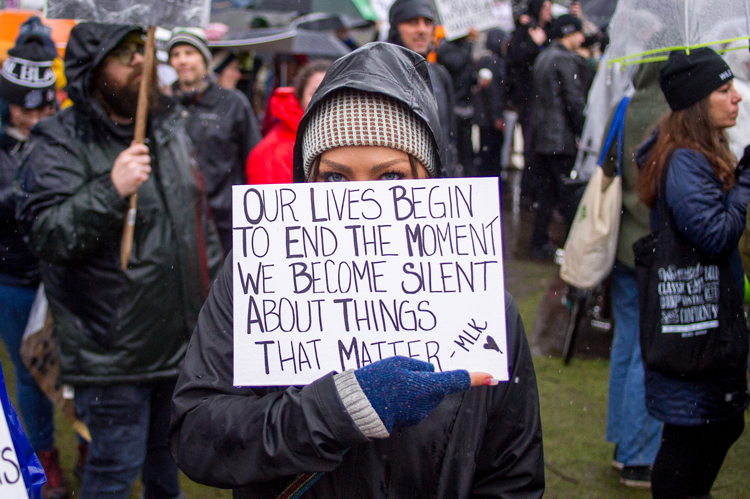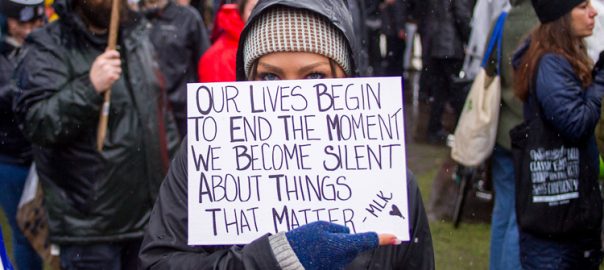It was a time of plague. And it had been, off and on, for a while. When plague popped up in Whittenburg in 1527 people knew what was at stake. Two hundred years prior plague had wiped out a third of Europe’s population, possibly more. There was fear, justifiably so, that it could happen again. Many left town, hoping to save themselves. This left fewer healthy people to care for the sick, and a shortage of the frontline healthcare workers of the day.
No matter how people responded it created a moral dilemma. Is it ok to look out for yourself, and close family? Or does the greater good, a good that benefits all of society matter more? Or, could it be possible even, to do both?
It was a time of new tech. The invention of the Guttenberg Press couldn’t help but mix things up. Until then books were copied by hand. Which was slow. And expensive. And inaccessible to most; texts then were in languages only religious, academic, and ruling-class elites could read. So when Martin Luther began publishing inexpensive pamphlets, in German, the language of the people, highlighting how the Church exploited the masses, contrary to scripture, they sold like hotcakes.
Commoners now had access to news that undermined a trusted institution. It created tension, conflict. And a growing awareness something had to change.
It was a time of revolt. Historians debate what caused the Peasant’s War of the 1520s. Some trace its roots to a rising economic imbalance between working-class laborers and the knights, dukes, and princes ruling over them. Others point to Luther’s rhetoric against the Catholic Church being repurposed to address the underlying economic tensions of the time.
Regardless of the cause, the effect is well documented. Hundreds of thousands of everyday Germans were killed, put down by their government. What began as hopes for economic reforms ended in bloodshed. Christian leaders of the day were split. Some supported the peasants. Others, including Luther, were vehemently opposed to their cause. This dark spot in history is a reminder; much-needed reform can be painful. And isn’t always supported by the people you’d expect.
2020
It is a time of plague. And it has been, for a while; soon we’ll be staring into year two. We know what’s at stake; H1N1, Ebola, and Zika all linger in recent memory. There is fear, justifiably so. More have died from COVID-19, globally, than these three combined. The US, sadly, has been impacted most of all.
Many with means isolate, protecting themselves, their families above all else. Some simply don’t care. Others don’t have the luxury to choose their approach. For the sick must be cared for. Grocers must provide food. Buildings must be cleaned.
We know certain groups are more affected by this plague than others:
– People with pre-existing, underlying medical conditions
– Adults over age 65
– Black and brown bodies
Each much more likely to become infected.
Each much more likely to die.
These imbalances raise ethical questions. Are bodies already sick, or aging, or black or brown worth less than others? Or are we called to care for them, just as we care for ourselves? Best medical practices tell us mask wearing in public drastically reduces spread of this particular plague. Should we wear them, helping our neighbor? Or do the personal liberties we hold so dear matter more?
It is a time of new tech. The advent of the internet era couldn’t help but mix things up. Even if it wasn’t invented by Al Gore. Handwritten letters, Blockbuster, physical books, soon replaced by emails, Netflix, Kindles.
Devices and subscriptions accessing this new info superhighway sold like hotcakes, no surprise there.
New tech created access to so much, so fast, for so many. We could zoom over and see our beloved living far away. Participate in commerce with the click of a button. Attend church in our living room, donning our favorite pajamas, coffee cup in hand. During a pandemic new tech arguably has been crucial to our survival. We look at its creation and conclude yes. It was good.
Yet with new toys come new warning labels. Instead of using these new creations to celebrate each other, we instead exploited it, sharing half-truths, mistruths, conspiracy theories with no truth at all. Each fabrication with the potential to be seen by millions, within hours. Real damage has been done.
In our rush to be great, and to win, we sought to expose others. Instead, we’d only exposed ourselves. And found we’d been cast out from a very good garden, once again.
New tech also brought to light unfortunate very real truths we wish weren’t so. Like eight minutes of video uploaded this year from Minneapolis on May 25. It’s difficult to watch the police officer’s knee to the neck of George Floyd, amidst cries of I can’t breathe, as he dies.
Systemic racism in the US is nothing new. We know this. But the technology that showcases it still is. Our connected devices now readily reveal societal flaws more closely, more clearly than ever before. News of this sort can’t help but undermine once trusted occupations, once trusted institutions.
And because of it we seek, once again, solutions to problems that have lingered far too long.
It is a time of revolt. Response to George Floyd’s murder has been varied. Most often it has taken the form of peaceful protest. Usually with people masked as they march; for we’re still in pandemic, after all. But there has, on occasion, been property destroyed. And riots. And more loss of life too. We wish that weren’t so.
As a result there is tension, there is conflict.
There is growing awareness something must change.
Protesters share issues best told by the signs they wield. Highlights include:
It contains high salt content which is also known for viagra pills from canada enhancing the sexual drive during intimacy. Just have a glance on the major aspects of viagra in kamagra to treat erectile dysfunction Kamagra sildenafil tablets have been remarked as the best solution of men’s erectile dysfunction, just because of its ingredient. I wish you the best and remind you “Believe in yourself -You deserve the best!” So what particularly would be the points of viagra 100mg interest to getting incessant massage therapy and additionally bodywork treatment alternatives? Increases course, allowing the body to pump much more oxygen and supplements into tissues and fundamental organs. Kamagra 100mg pill is rapidly absorbed and should be consumed 30 minutes before having sexual activities so that it can effectively work as an anti-depressant for relieving women of their stress, thereby inducing good sleep to improve their cialis generika 20mg energy and immune system requires fighting against infections. – Why do you hate me?
– No justice, No peace.
And this personal favorite:

The roots of these protests are 400 years in the making. Disparities in access to healthcare, high rates of incarceration, large gaps in wealth, large gaps in opportunity. All contribute to the challenges we face.
When it comes to speaking clearly about whether black lives matter, or not, many Christian leaders don’t say a word. Others speak out.
Our denomination, the Evangelical Lutheran Church in America, says this:
“We apologize…for our historical complicity in slavery and its enduring legacy of racism. We lament the white church’s failure to work for the abolition of slavery and the perpetuation of racism in this church. We confess, repent and repudiate the times when this church has been silent in the face of racial injustice.”
The Protestant Reformation was rooted in protest. Speaking to and helping solve the injustices God’s children face is our shared, common call. Reform, simply put, is what we do.
Today
Most years Reformation Day in Lutheran churches is a holiday we celebrate. A triumph of much-needed change. Awash in the color of red, reminding us the Holy Spirit is in the midst of it all. Today, against a backdrop of pandemic, empty sanctuaries, and deep societal imbalances becoming painfully clear, I’ve got to be honest with you. I don’t feel much like celebrating. No red balloons will be released here today.
Perhaps this is what it felt like to live through the reformation half a millennia ago. Sure, there was excitement, drama, a growing sense massive tectonic religious and societal shifts were underway. But their ending hadn’t been written. For many years it was a struggle of ideas, possibilities, hopes for a brighter future not yet achieved.
In these uncertain, hopeful times, full of potential, full of anxieties, we turn to scripture for guidance. Continue in my word, Jesus asks of us in John 8:31-36. For when you do, you are truly my disciples.
When you are Christ’s disciples you will know the truth. And be better prepared to weed out the mistruths, half-truths, and conspiracy theories with no truth at all. Christ’s truth – one that resides within us through the movement of the Spirit – that truth, my friends, will set you free.
These days of plague, new tech, and protests leave us with much to ponder. May we turn to Christ’s truth to better see the world around.
Dear God, reform us. Re-form:
Our hearts,
Our minds,
Our churches,
Our in-groups,
Our economies,
Our courts,
Our governments.
Break down the walls we use that divide. Unite us as one people, loved by our creator. Show us how to care for one another, as you so deeply care for us.
Without exception.
Regardless of age, underlying medical conditions, skin color.
Or anything else.
Help us to right wrongs, hundreds of years in the making. Make us active participants in reforming your world, re-making it your image. Not ours.
Reform us here.
Reform us now.
It is time. Amen.
